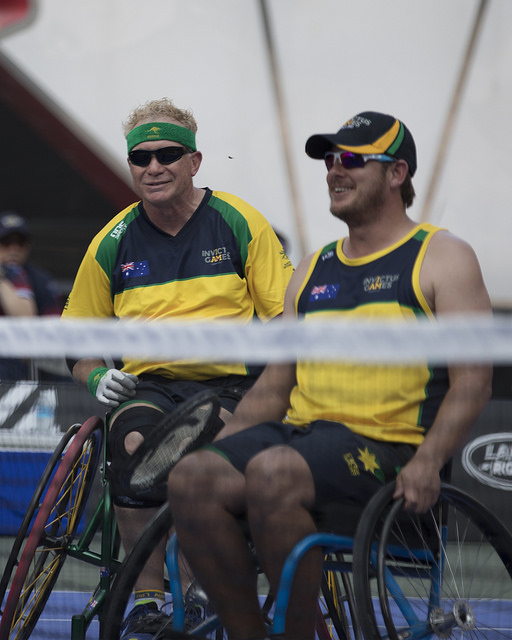Today’s preliminary wheelchair tennis open doubles pools saw a pre-Games kickoff, featuring matches with Canada, the United States, Netherlands, United Kingdom, Australia and New Zealand. Before the matches began, the Invictus team caught up with the United Kingdom’s Kirk “Spike” Hughes:
“I’ve seen myself grow for the last year or so. It’s really heartwarming to get involved again. I’m also doing wheelchair basketball and handcycling at the Games,” said Kirk.

Kirk carried on a family tradition, as his father was also in the Navy. Kirk was an able seaman and marine engineer and served for five years before his 2002 discharge. He is in attendance at the Games with his wife, two children and parents.
The first matches saw Canada versus United States, with Canada winning 6–5. In the Netherlands versus Canada match, however, Canada didn’t fare as well, winning only one match, resulting in score of 6–1. The United Kingdom’s Kirk Hughes and his tennis partner Cornelia Oosthuizen took the match with a 6–3 win over Australia’s Daniel Jefferey and Jamie Tanner.
The final match of the day set Darryl Burton and Stephen Fell of New Zealand against Sean Lawler and Stewart Sherman of Australia. Kiwis and Aussies led the crowd in some rowdy cheers between points as the latter leapt to an early 3–0 before the former broke the Aussie serve to narrow the score to 3–1. The teams traded breaks to bring the score to 4–2. New Zealand brought the next game to deuce before taking it and narrowing the deficit to 4–3. That’s as close as the Kiwis would get in a 6–3 loss to Australia.

Stewart Sherman served in the Australian defence force for 13 years before retiring in 2013. “I was a combat medic,” said Stewart.
Suffering from post-traumatic stress injury and soft-tissue injuries hasn’t stopped Stewart from taking to the court in wheelchair tennis at the 2017 Invictus Games. “I was in Orlando last year and competed in tennis there as well,” he said. He’ll continue to show his enthusiasm for wheelchair sports later in the Games, wearing his country’s colours for wheelchair basketball and wheelchair rugby.
“Wheelchair sports are amazing. They’re a great equalizer for everyone,” he said. “It’s a great way to get involved with the disability community — it brings everyone together and creates an equal playing field.”
Just before the Orlando Invictus Games, Stewart was introduced to wheelchair sports and has been participating in them ever since. In his hometown of Newcastle, Australia, he runs a program for rugby, basketball and tennis for disabled people in the community.
“A friend went to London [Invictus Games] in 2014,” said Stewart. “He recommended that sport would be great for my recovery. And he was absolutely correct. It’s changed my life completely, and I’m on an upward journey from here on in.”


